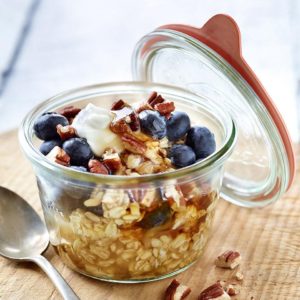What To Eat For Breakfast
There seems to be a lot of confusion over what to eat for breakfast and if we really need to eat breakfast. There have been studies that those that do not consume breakfast have higher BMI’s, consume greater amounts of fat throughout the day and have lower performance levels at school and at work. Eating breakfast wakes up your metabolism, and helps you get those important nutrients you need to jump start your day.
These are some breakfast’s I recommend and why:
- Eggs: I recommend an omelet and through any veggies you like into them for added fiber and nutrition. A great source of high quality protein, eggs are loaded with vitamin B2, D, B6, B12, selenium, zinc, iron and copper. Each whole egg has 80 calories. Eggs help build muscles, Build brain health, produce energy in all the cells of our body, keep our immune system strong , support eye health and help us feel full and satisfied.
- Oatmeal with berries: A whole grain, oatmeal is an excellent source of soluble fiber which helps naturally pull bad cholesterol (LDL) out of the body due to its beta glucan. Oats are a great source of Manganese, phosphorus, magnesium, copper, iron, zinc, folate, thiamin and Vitamin B5. Oats are high in fiber which makes it satisfying. It can aid in weight loss, and help lower blood glucose levels as well. 1 cup of cooked unsweetened oatmeal has 158 calories, and 27 grams of carb. Throw in some berries for extra antioxidant power.
- Greek yogurt: Loaded with calcium, protein, potassium, zinc, B6 and B12, Greek yogurt is a great way to start the day. It is triple strained which makes it heartier and has less lactose, so those that have lactose intolerance may be able to tolerate it better than most dairy. It also has probiotics which strengthen the immune system and create a healthy environment for your gut. Add some slivered almond for added protein and a nice crunchy texture. Try and find greek yogurts that are approximately 100 calories and no more than 6 grams of sugar per serving.
- Chia pudding: Chia seeds are a whole grain loaded with antioxidants, Omega 3’s, calcium, protein and fiber. These fun little seeds change texture and size when wet, so making them into a pudding is very satisfying. They can aid with weight loss and there has been some limited research that they are beneficial for heart health. 2 Tablespoons have 139 calories.
- Almond butter on whole grain bread: Almond butter is a healthy source of mono unsaturated fat, vitamin E, fiber and magnesium. 1 tablespoon is 100 calories. Nuts may reduce the risk of heart disease, diabetes and stroke. Make sure any nut butter you choose contains ONLY nuts and salt. There should be no other ingredients added. Adding a slice of enriched whole grain toast adds more fiber, vitamin E, B6, magnesium, thiamin, riboflavin, niacin, potassium, iron, folate and protein. Whole grains can aid with blood glucose control, weight maintenance, and reduce the risk of certain cancers.
Breakfast does not have to be the biggest meal of the day, but you should have something! Choose wisely and and you will be adding much needed energy and nutrition to your day.
Creamy Blueberry-Pecan Overnight Oatmeal
From the EatingWell Kitchen
In this no-cook overnight oatmeal recipe, just quickly reheat the oats in the morning and top with berries, maple syrup and pecans for an easy, on-the-go breakfast.
Ingredients 1 serving
- ½ cup old-fashioned rolled oats
- ½ cup water
- Pinch of salt
- ½ cup blueberries, fresh or frozen, thawed
- 2 tablespoons nonfat plain Greek yogurt
- 1 tablespoon toasted chopped pecans
- 2 teaspoons pure maple syrup
Preparation
Active 10
m
Ready In 8 h 10 m
- Combine oats, water and salt in a jar or bowl. Cover and refrigerate overnight. In the morning, heat if desired, and top with blueberries, yogurt, pecans and syrup.
- People with celiac disease or gluten-sensitivity should use oats that are labeled “gluten-free,” as oats are often cross-contaminated with wheat and barley.
Nutrition information
- Serving size: about 1 cup
- Per serving: 291 calories; 8 g fat(1 g sat); 6 g fiber; 49 g carbohydrates; 9 g protein; 27 mcg folate; 1 mg cholesterol; 18 g sugars; 9 g added sugars; 45 IU vitamin A; 7 mg vitamin C; 57 mg calcium; 2 mg iron; 161 mg sodium; 297 mg potassium
- Carbohydrate Servings: 3½
- Exchanges: 2 starch, 1 fruit, ½ other carbohydrate, 1 fat




